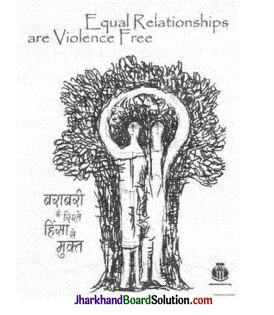JAC Board Class 8th Social Science Solutions Civics Chapter 4 Understanding Laws
JAC Class 8th Civics Understanding Laws InText Questions and Answers
Page 45
Question 1.
The word ‘arbitrary’ has been used earlier in this book and you’ve read what the word means in the Glossary of Chapter 1. The word ‘sedition’ has been included in the Glossary of this chapter. Read the Glossary descriptions of both words and then answer the following questions: State one reason why you think the Sedition Act of 1870 was arbitrary? In what ways does the Sedition Act of 1870 contradict the rule of law?
Answer:
The Sedition Act of 1870 was arbitrary because according this act, English people could arrest and detain any person they want. It contradicts the rule of law as they in rule of law, they can’t arrest anyone without proof.
![]()
Page 48
Question 2.
What do you understand by ‘domestic violence’? List the two rights that the new law helped achieve for women who are survivors of violence.
Answer:
Domestic violence refers to the injury or harm or threat caused by an adult male, usually the husband against his wife. Injury can be caused by physically beating up or emotionally abusing her which includes verbal, sexual and emotional abuse.
Question 3.
Can you list one process that was used to make more people aware of the need for this law?
Answer:
One process that was used to make more people aware of the need for this law was public discussions and meetings.
Question 4.
From the above storyboard, can you list two different ways in which people lobbied Parliament? (See NCERT pg 46 – 48)
Answer:
Two different ways in which people lobbied Parliament are as follows:
- Submission of Demand
- Debating and arguing.
Question 5.
In the following poster, what do you understand by the phrase ‘Equal Relationships are Violence Free’? F aual Relationships are Violence Free

Answer:
The phrase ‘Equal Relationships are Violence Free’ means equal rights are enjoyed by both husband and wife in the family. Neither of them should suppress each other. Such relationships are always violence free since they care for each other.
![]()
Page 50
Question 6.
Read the newspapers/watch news onTV for a week and find out if there are any unpopular laws that people in India or around the world are currently protesting.


List the three forms of protest that you see in the above photos.
Answer:
In first part of the question, students need to answer on their own. The three forms of protest that you see in above photos are
- Strike – hunger strike
- Dhama
- Rally
JAC Class 8th Civics Understanding Laws Textbook Questions and Answers
Question 1.
Write in your own words what you understand by the term the ‘rule of law’. In your response include a fictitious or real example of a violation of the rule of law.
Answer:
The rule of law means that all laws apply equally to all citizens of the country and no one can be above the law. Neither a government official nor a wealthy person nor even the President of the country is above the law. All persons in independent India are equal before the law. The law cannot discriminate between persons on the basis of their religion, caste or gender. There is a specific punishment for every crime or violation of law and also a specific process through which the guilt of the person has to be established.
The punishment for any crime committed will be the same for every person, irrespective of his power or position. For example, there are many businessmen who own property worth crores but they do not even pay tax for the same. While filing the tax return, they show only a part of their total property and wealth. However, they are not questioned for this by the ordinary income tax officials because the officials have the fear of losing their jobs as the businessmen are very powerful. This shows how people in power can easily violate the laws.
![]()
Question 2.
State two reasons why historians refute the claim that the British introduced the rule of law in India.
Answer:
Two reasons – historians refute to claim that the British introduced the rule of law in India are as follows:
- The colonial law was arbitrary. As for example of the arbitrariness of British law is the Sedition Act of 1870. According to this act any person protesting or criticising the British government could be arrested without due trial.
- The Indian nationalists played a prominent role in the development of the legal sphere in British India. They protested against the arbitrary use of authority by the British. They also fought for equality of all.
Question 3.
Re-read the storyboard on how a new law on domestic violence got passed. Describe in your own words the different ways in which women’s groups worked to make this happen.
Answer:
Many women’s groups worked hard to get the bill against domestic violence passed by the Government. For this they made the following efforts:
- The groups reported multiple cases of domestic violence to various forums like public protests, hearings, meetings with other organisations, press conferences and petitions to the government.
- A group of lawyers, law students and activists worked together for drafting the Domestic Violence Bill. The Bill was first introduced in Parliament in 2002, but it was not to the satisfaction of all.
- Several women’s organisations and National Commission for Women made submissions to the Parliamentary Standing Committee requesting certain changes in the Bill.
- In December 2002, the recommendations of the Standing Committee were submitted to the Rajya Sabha and the Lok Sabha.
- A new bill was reintroduced in Parliament in 2005. After being passed in both houses of Parliament, it was sent to the President for his assent.
- Hence, the Protection of Women from Domestic Violence Act came into effect in 2006.
Question 4.
Write in your own words what you understand by the following sentence on page 44-45: They also began fighting for greater equality and wanted to change the idea of law from a set of rules that they were forced to obey, to law as including ideas of justice.
Answer:
Indians were being discriminated and biased in their own country by the British government, during the British period. They were forced to follow the set of rules and laws that were arbitrary and tyrannical. One example of the arbitrary law is that The Sedition Act of 1870 came to be a turning point in the struggle for freedom in India.
According to the Sedition Act any person protesting or criticising the British government could be arrested without due trial. Indian nationalists began to protest and criticise this arbitrary use of authority by the British. They began to fight for their rights and wanted a set of rules that were equal for all.
JAC Class 8th Civics Understanding Laws Important Questions and Answers
Multiple Choice Questions
Question 1.
The most important provision in the Constitution is:
(a) Laws are different for different caste.
(b) Some persons in independent India are equal before the law.
(c) All persons in independent India are equal before the law.
(d) AH senior citizen in independent India are equal before the law.
Answer:
(c) All persons in independent India are equal before the law.
Question 2.
………….. is in charge of making laws in India.
(a) The High Court
(b) The Parliament
(c) Supreme Court
(d) The Prime Minister
Answer:
(b) The Parliament
![]()
Question 3.
In ancient India, law was different from today as:
(a) Punishments to lower castes were more harsh.
(b) Brahmins were being more harshly penalised.
(c) There was no punishment for Shudhras.
(d) Punishments were same as today.
Answer:
(a) Punishments to lower castes were more harsh.
Question 4.
The Sedition Act of 1870 means that:
(a) Any British person protesting or criticising the British government could be arrested without due trial.
(b) Any person protesting or criticising the British government could be arrested without due trial.
(c) Any Indian protesting or criticising the British government could be arrested with due trial.
(d) None of these
Answer:
(b) Any person protesting or criticising the British government could be arrested without due trial.
Question 5.
The Protection of Women from Domestic Violence Act, was came in the year…… .
(a) 2000
(b) 2009
(c) 2008
(d) 2006
Answer:
(d) 2006
Question 6.
The Hindu Succession Amendment Act 2005 says that………..
(a) along with sons and daughters, father can also get an equal share of family property.
(b) grandparents, sons, daughters, and their mothers can get an equal share of family property.
(c) sons, daughters, and their mothers can get an equal share of family property.
(d) all of these
Answer:
(c) sons, daughters, and their mothers can get an equal share of family property.
![]()
Question 7.
The mediums through which voice of people can be heard through is/ are……. .
(a) local meetings
(b) radio broadcasts
(c) TV reports
(d) all of the above
Answer:
(d) all of the above
Question 8.
The Rowlett Act was passed on………
(a) 10th March 1919
(b) 19th April 1919
(c) 10th March 1920
(d) 10th May 1921
Answer:
(a) 10th March 1919
Question 9.
Domestic violence means ………
(a) injury and abuse
(b) threat of injury
(c) physical beating
(d) all of these
Answer:
(d) all of these
Question 10.
In a democratic government, in case of unpopular laws, people might………
(a) hold public meetings
(b) write in media such as newspaper, journal, etc.
(c) show reports in TV
(d) All of these
Answer:
(d) All of these
Very Short Answer Type Questions
Question 1.
What was Sedition Act of 1870?
Answer:
Sedition Act of 1870 states that any person protesting or criticising the British government could be arrested without due trial.
Question 2.
When was the Hindu Succession Act revised?
Answer:
The Hindu Succession Act was revised in 2005.
Question 3.
hich year of Jallianwala Bagh massacre happened? Who gave the order to shoot the protestors?
Answer:
The Jallianwala Bagh massacre which is also known as the Amritsar massacre took place on 13 April 1919. General Dyer gave the order to shoot the protestors.
Question 4.
What are the important changes introduced by the Hindu Succession Amendment Act 2005?Answer: According to this new law, sons,daughters and their mothers can get an equal share of family property.
![]()
Question 5.
Who submits its report regarding any Bill to Rajya Sabha and Lok Sabha?
Answer:
Parliamentary Standing Committee submits its report regarding any Bill to Rajya Sabha and Lok Sabha.
Question 6.
What Article 14 of the Indian constitution says?
Answer:
Article 14 belongs to Equality before law. It states that the State shall not deny to any person equality before the law or the equal protection of the laws within the territory of India.
Question 7.
What do you mean by controversial law?
Answer:
Controversial law is the law whichfavours one group and disregards the other.
Question 8.
Who introduced the rule of law in India?
Answer:
The Indian nationalists introduced the rule of law in India.
Question 9.
Which type of law is ‘Protection of Women from Domestic Violence Act’?
Answer:
‘Protection of Women from Domestic Violence Act’ is a civil law.
Question 10.
What do you think citizens do when they disagree with a law?
Answer:
The citizens hold public meetings, write articles and journals in newspaper, report to TV channels to express there disagreement with a law.
Short Answer Type Questions
Question 1.
Where and in what form is the law introduced?
Answer:
In Parliament all legislative proposals are brought in the forms of Bills. A Bill is a draft statute which becomes law after it is passed by both the Houses of Parliament and assented to by the President.
Question 2.
What are the common laws that govern us?
Answer:
Some of the common laws that govern us are as follows:
- Specific age of marriage
- The age at which a person can vote
- The laws dealing with buying and selling of property.
Question 3.
Explain the provisions of Rowlatt Act. How did Indians react to it?
Answer:
Rowlatt Act allowed the British government to arrest people without due trial. Indian nationalists including Mahatma Gandhi were vehement in
their opposition to the Rowlatt bills. Despite the large number of protests, the Rowlatt Act came into effect on 10 March 1919.
![]()
Question 4.
How was the system of law during ancient times in India?
Answer:
In ancient India, there were innumerable and often overlapping local laws. Different communities enjoyed different degrees of autonomy in administering these laws among their own. In some cases, the punishment that two persons received for the same crime varied depending on their caste backgrounds, with lower castes being more harshly penalised.
Question 5.
Explain in brief the ‘Rule of Law’.
Answer:
Rule of law means that all laws apply equally to all citizens of the country and no one can be above the law. Neither a government official, nor a wealthy person nor even the President of the country is above the law. Any crime or violation of law has a specific punishment as well as a process through which the guilt of the person has to be established.
Question 6.
Explain the ways in which the citizens can express their views in relation to laws made in the Parliament.
Answer:
Citizens can express their views in relation to laws made in the Parliament in the following ways:
- by holding public meetings and addressing them,
- by writing about it in newspapers and magazines,
- by reporting to TV news channels etc.
Question 7.
What is Domestic Violence?
Answer:
Domestic violence is the violence which refers to the injury or harm or threat of injury caused by an adult male, usually the husband, against his wife. Injury may be caused by physically beating up the woman or by emotionally abusing her which includes verbal, sexual and economic abuse. The Protection of Women from Domestic Violence Act 2005 extends the understanding of the term ‘domestic’ to include all women who ‘live or have lived together in a shared household’ with the male member who is perpetrating the violence.
![]()
Question 8.
What are the different categories under which law can be classified?
Answer:
Some of the categories under which law can be classified are as follows:
- Criminal law
- Contract Law
- Property Law
- International law
- Equity and Trust Laws
Question 9.
Explain in brief on Lady Justice.
Answer:
Lady Justice or Justitia is the Roman Goddess of Justice. It is a personification of the moral force that underlies the legal system. Her blindfolded eyes symbolise equality under the law and impartiality towards all the people who are governed by it. The weighing scales represent the balancing of people’s interests under the law and her sword denotes the law’s force of reason.
Long Answer Type Questions
Question 1.
Explain the controversial law and unpopular law with the help of an example.
Answer:
Sometimes a law can be constitutionally valid and hence legal but it can continue to be unpopular and unacceptable to people because they feel that the intention behind it is unfair and harmful. For example, various municipal laws on the use of space within municipal limits often make hawking and street vending illegal. No one will dispute the necessity for some rules to keep the public space open so that people can walk on the pavements easily.
However, one also cannot deny that hawkers and vendors provide essential services cheaply and efficiently to the millions living in a large city. This is their means of livelihood. Hence, if the law favours one group and disregards the other it will be controversial and lead to conflict. This ultimately brings lots of chaos in day to day life of common people.
![]()
Question 2.
Mention the ways in which the Indians played an important role in the evolution of rule of law during colonial period.
Answer:
There were several ways in which Indians played a major role in the evolution of the rule of law during the colonial period. They are as follows:
(i) Indian nationalists began protesting and criticising this arbitrary use of authority by the British. They also began fighting for greater equality and wanted to change the idea of law from a set of rules that they were forced to obey, to law as including ideas of justice.
(ii) By the end of the nineteenth century, the Indian legal profession also began emerging and demanded respect in colonial courts. They began to use law to defend the legal rights of Indians.
(iii) Indian judges also began to play a greater role in making decisions.